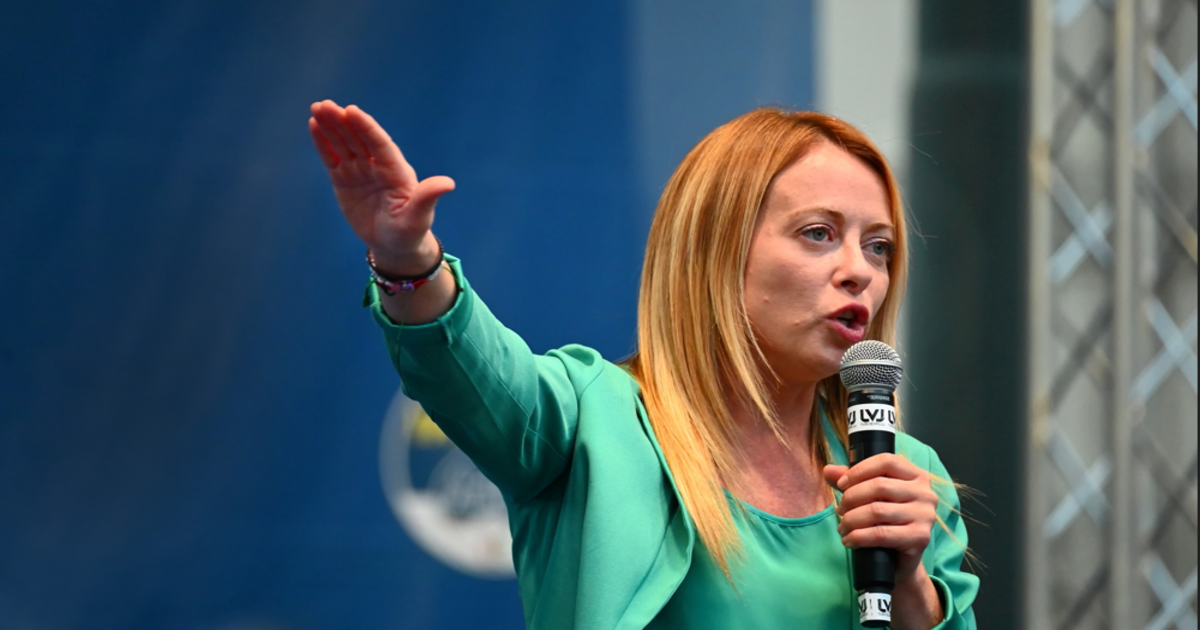Meloni: Mussolini’s Come Back in Italy?
Giorgia Meloni is a cynical, quick-lipped, unmarried mother who speaks French and passable English. She is many things, but she is not a female Mussolini.
September 27, 2022

If Italian politics does one thing, it is to avoid surprises. And so it was this time around.
Meloni’s victory: An opening created by the left
The arrival of Giorgia Meloni as probable prime minister was completely predictable – after the Italian left and center failed to form a united list.
Two-thirds of Italian parliament is voted in on basis of proportional representation, while one-third is voted in on basis of first-past-the-post. The hard right won 90% of all seats assigned on a strictly majoritarian system.
And the fact that the hard right can likely govern based on only a 44% vote tally is actually doubly due to the left’s political operations.
In 2018, it was the mainstream left Partido Democratico (PD), a fusion of Italy’s socialist and communist parties, that won support for a change to the electoral system that provided the largest voting bloc the opportunity to govern.
The goal then was to make Italy’s notoriously fragmented political system more governable. That built-in advantage for the largest vote-getter was now ceded to Meloni – who proved to be a more adept political operator than, for example, the Five Stars.
Is Meloni a fascist?
Giorgia Meloni is a cynical, quick-lipped, unmarried mother who speaks French and passable English. She is many things but she is not a female Mussolini.
She is only the latest of the many populist leaders from Italy’s right in recent years. The longest-lasting was Silvio Berlusconi – now 86 years old. He created his “Forza Italia” party based on his network of radio and TV stations.
On that basis, he managed to side-line Italy’s traditional Christian Democrat governing block after 1990. The decomposition of the Christian Democrats presented a move toward self-destruction that, in some fashion, is now also gripping Italy’s left in its own camp.
The recomposed right
Italian Christian Democratic politics was run by Catholic conservative fixers, sometime using the mafia to settle scores.
Not much wonder that they were pushed aside by Berlusconi’s populism – much as Boris Johnson’s energetic populist nationalism marginalized the traditional Tory Party after 2010.
Following Berlusconi came the Northern League headed by Matteo Salvini, a bulldozer demagogue steadily ranting against immigration.
His Northern League started as regional-nationalist movement wanting to see northern Italy’s industrial heart create a separate state called “Padania.”
It was to be a republic free of any links with Naples and southern Italy (or the cynical political cardinals who controlled everything from Rome).
Salvini reached a maximum of 17.4&% of the vote in the 2018 elections. This gave him the position of deputy prime minister, not the PM slot that Ms. Meloni will claim with her 26% for her Brothers of Italy.
Checks and balances on Meloni
But like Salvini, Meloni can only count on a minority of deputies to support her in the Italian Parliament. The majority of Italians did not vote for her or her right-wing block in the most recent election.
And of those voters that did vote for her and her political partners, many of those votes were ones of protest at the chronic incapacity of Italian politicians to form coherent governments.
It is not by accident that, in order to make progress on reforming Italy, the country often ends up calling in unelected technocrats like Mario Draghi, the former chief of the European Central Bank, to serve as Prime Minister.
Meloni and her allies outside Italy
That Meloni, 45, has enjoyed her rise to global right-wing stardom as the darling of the populist, nationalist movements of the 21st century is a real cause for concern.
She was close to Steve Bannon, who thought after Donald Trump’s win in 2016 that he could create a world movement of far-right, anti-immigrant, anti-EU nationalist parties in Europe.
He was looking to Marine Le Pen in France, Boris Johnson in England, Viktor Orban in Hungary and other 21st century populist, immigrant-hating political movements.
Notably, all of them emerged from the decaying bodies of post-1945 Christian democracy and moderate Eisenhower-Macmillan conservative parties.
How radical will Meloni be?
Can or will Meloni take Italy into a new Mussolini era? Unlikely. Brexit in 2016 dealt a serious blow to the European populist right.
The at times almost comic opera of British politics since 2016 and the fact that on almost every index – growth, investment, strength of sterling, GDP, public service, global influence – Brexit Britain is now the sick man of Europe and is a strong note of caution for Meloni.
To begin with, Meloni, like Marine Le Pen in France, or the Sweden Democrats have removed all references to leaving the EU or the Euro or defying the European Court of Justice, from their political programs.
Using or abusing the EU?
Meloni says she will follow the EU line on economic rules or the European unity against Putin’s war on Europe following his invasion of Ukraine.
She definitely needs the €200 billion of EU money the European Commission has allocated Italy to rebuild after the pandemic but on condition Rome follows agreed rules with Brussels.
The latest news is that Meloni is trying to persuade Fabio Panetta, Italy’s board member of the European Central Bank to return to Rome as her finance minister.
Panetta is a conventional establishment economist who presided over Italy’s insurance system. That Meloni is reaching out to him shows she will not challenge EU financial orthodoxy.
Who won in Italy – the right or the fascists?
The big debate now gripping Europe is who actually won the Italian elections. Thoughout Europe, the left basically says the fascists are back.
In contrast, the European People’s Party — the federation of center-right parties which traditionally has a strong hold over much of the Brussels bureaucracy — hails the Italian result as a victory for the European center right.
Of course, Meloni may try and strike out in a more radical rightist direction just as Matteo Salvini did when he became Italian deputy prime minister in 2018.
But he flopped. Italians then rejected the Duce principle of a single strong leader. With that story in mind, Meloni is likely too smart to repeat the Salvini approach.
Yes, Giorgia Meloni is great at self-promoting publicity. And true, she likes picking on easy targets like immigrants. But she has never taken a tough, unpopular decision in her life.
Swappable prime ministers
Italians are happy to swap their prime ministers, on the Sicilian principle that “everything must change so everything stays the same.”
But that is a far cry from a prime minister who actually believes his or her own rhetoric and thinks having a minority government allows dramatic new changes.
What next?
Meloni will get her crack at government. But how she long she lasts is far from certain. Since 1945, Italy has had 30 prime ministers in contrast to 13 in Britain.
Takeaways
After the Italian elections, the big debate now gripping Europe is what the victory of Giorgia Meloni actually means – for Italy and for Europe at large?
Center-left voices argue that Meloni’s victory means the fascists are back. In contrast, the center-right in the EU sees the Italian election result as a useful caution flag against the left’s inclination to focus too much on identity politics.
That Meloni has enjoyed her rise to global right-wing stardom as the darling of the populist, nationalist movements of the 21st century is a real cause for concern.
Giorgia Meloni is great at self-promoting publicity and likes picking on easy targets like immigrants. But she has never taken a tough, unpopular decision in her life.
As Meloni gets to work picking a right-wing government the key questions are: How radical will she be, and how long will she last?
Italians are happy to swap their prime ministers on the Sicilian principle that “everything must change so everything stays the same.”

